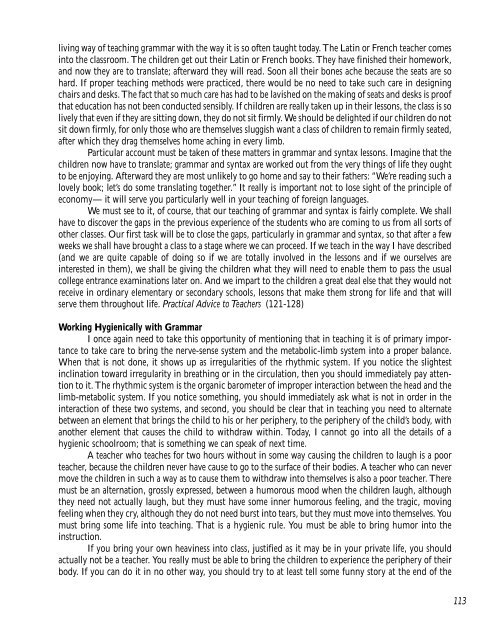Colloquium on English - Research Institute for Waldorf Education
Colloquium on English - Research Institute for Waldorf Education
Colloquium on English - Research Institute for Waldorf Education
Create successful ePaper yourself
Turn your PDF publications into a flip-book with our unique Google optimized e-Paper software.
living way of teaching grammar with the way it is so often taught today. The Latin or French teacher comes<br />
into the classroom. The children get out their Latin or French books. They have finished their homework,<br />
and now they are to translate; afterward they will read. So<strong>on</strong> all their b<strong>on</strong>es ache because the seats are so<br />
hard. If proper teaching methods were practiced, there would be no need to take such care in designing<br />
chairs and desks. The fact that so much care has had to be lavished <strong>on</strong> the making of seats and desks is proof<br />
that educati<strong>on</strong> has not been c<strong>on</strong>ducted sensibly. If children are really taken up in their less<strong>on</strong>s, the class is so<br />
lively that even if they are sitting down, they do not sit firmly. We should be delighted if our children do not<br />
sit down firmly, <strong>for</strong> <strong>on</strong>ly those who are themselves sluggish want a class of children to remain firmly seated,<br />
after which they drag themselves home aching in every limb.<br />
Particular account must be taken of these matters in grammar and syntax less<strong>on</strong>s. Imagine that the<br />
children now have to translate; grammar and syntax are worked out from the very things of life they ought<br />
to be enjoying. Afterward they are most unlikely to go home and say to their fathers: “We’re reading such a<br />
lovely book; let’s do some translating together.” It really is important not to lose sight of the principle of<br />
ec<strong>on</strong>omy— it will serve you particularly well in your teaching of <strong>for</strong>eign languages.<br />
We must see to it, of course, that our teaching of grammar and syntax is fairly complete. We shall<br />
have to discover the gaps in the previous experience of the students who are coming to us from all sorts of<br />
other classes. Our first task will be to close the gaps, particularly in grammar and syntax, so that after a few<br />
weeks we shall have brought a class to a stage where we can proceed. If we teach in the way I have described<br />
(and we are quite capable of doing so if we are totally involved in the less<strong>on</strong>s and if we ourselves are<br />
interested in them), we shall be giving the children what they will need to enable them to pass the usual<br />
college entrance examinati<strong>on</strong>s later <strong>on</strong>. And we impart to the children a great deal else that they would not<br />
receive in ordinary elementary or sec<strong>on</strong>dary schools, less<strong>on</strong>s that make them str<strong>on</strong>g <strong>for</strong> life and that will<br />
serve them throughout life. Practical Advice to Teachers (121-128)<br />
Working Hygienically with Grammar<br />
I <strong>on</strong>ce again need to take this opportunity of menti<strong>on</strong>ing that in teaching it is of primary importance<br />
to take care to bring the nerve-sense system and the metabolic-limb system into a proper balance.<br />
When that is not d<strong>on</strong>e, it shows up as irregularities of the rhythmic system. If you notice the slightest<br />
inclinati<strong>on</strong> toward irregularity in breathing or in the circulati<strong>on</strong>, then you should immediately pay attenti<strong>on</strong><br />
to it. The rhythmic system is the organic barometer of improper interacti<strong>on</strong> between the head and the<br />
limb-metabolic system. If you notice something, you should immediately ask what is not in order in the<br />
interacti<strong>on</strong> of these two systems, and sec<strong>on</strong>d, you should be clear that in teaching you need to alternate<br />
between an element that brings the child to his or her periphery, to the periphery of the child’s body, with<br />
another element that causes the child to withdraw within. Today, I cannot go into all the details of a<br />
hygienic schoolroom; that is something we can speak of next time.<br />
A teacher who teaches <strong>for</strong> two hours without in some way causing the children to laugh is a poor<br />
teacher, because the children never have cause to go to the surface of their bodies. A teacher who can never<br />
move the children in such a way as to cause them to withdraw into themselves is also a poor teacher. There<br />
must be an alternati<strong>on</strong>, grossly expressed, between a humorous mood when the children laugh, although<br />
they need not actually laugh, but they must have some inner humorous feeling, and the tragic, moving<br />
feeling when they cry, although they do not need burst into tears, but they must move into themselves. You<br />
must bring some life into teaching. That is a hygienic rule. You must be able to bring humor into the<br />
instructi<strong>on</strong>.<br />
If you bring your own heaviness into class, justified as it may be in your private life, you should<br />
actually not be a teacher. You really must be able to bring the children to experience the periphery of their<br />
body. If you can do it in no other way, you should try to at least tell some funny story at the end of the<br />
113

















